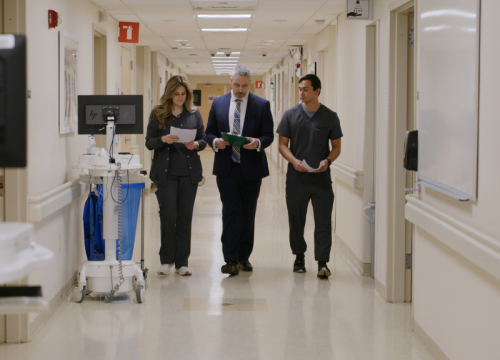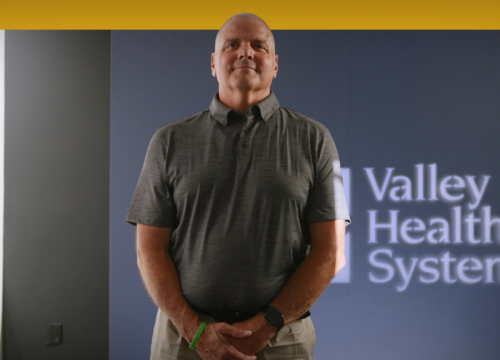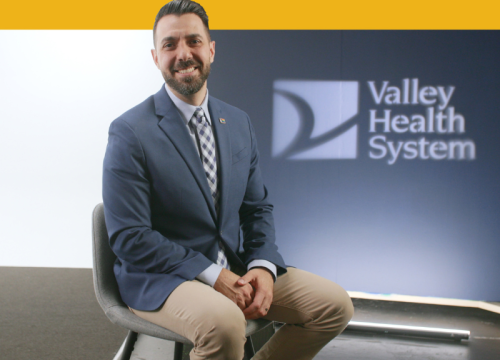At Valley Health System's Inpatient Recovery and Wellness Unit, located at Valley Health System – Ridgewood Campus (223 N. Van Dien Ave., Ridgewood, New Jersey), we understand that the journey to recovery from substance use disorder begins with safe and compassionate withdrawal management. Our program is designed to provide individuals with the support and care they need during this challenging phase, setting the foundation for a successful recovery journey.
We are dedicated to providing compassionate, evidence-based care to individuals seeking substance use disorder treatment (SUDT). Our comprehensive withdrawal management program is designed to empower individuals to take the first step toward a healthier, more fulfilling life.
What is Withdrawal Management?
Withdrawal management, sometimes referred to as detoxification or detox, describes the process of safely and effectively helping individuals manage the physical and psychological symptoms that occur when they stop using or reduce their intake of a substance they have become dependent on. This substance could be drugs, alcohol, or even certain medications.
The goal of withdrawal management is to help individuals navigate through the acute withdrawal phase as comfortably and safely as possible, while also addressing any medical or psychological complications that may arise. It's an essential first step in the journey toward recovery from substance use or addiction.
WATCH: Christopher Rusk, Manager of Valley's Recovery and Wellness Unit, answers questions about withdrawal management and Valley's approach to helping patients safely recover from substance use disorders.
Benefits of an Inpatient Withdrawal Management Program
Withdrawal from addictive substances can pose serious medical risks, particularly if attempted suddenly or without proper supervision. Having individuals undergo withdrawal management in a specialized unit, staffed by clinical professionals who are skilled in SUDT, is essential for ensuring their safety and well-being.
In such a unit, individuals can be closely monitored for any potential complications that may arise during the withdrawal process. Clinical professionals, including medical doctors, nurses, and addiction specialists, can promptly respond to any needs that arise.
A withdrawal management unit provides a safer and more effective path to recovery compared to attempting withdrawal independently. Here, you'll have access to a team of professionals who specialize in SUDT. We offer evidence-based treatments and therapies with higher success rates and outcomes. Additionally, various medications are available to assist in managing withdrawal symptoms and reducing cravings. This comprehensive approach ensures that you receive the support and care needed to navigate withdrawal successfully and begin your journey toward long-term recovery.
How Will Withdrawal Management Help Me Get Better in the Long Term?
Withdrawal management offers long-term benefits because of the short-term success it brings. The more successful a person’s early days in treatment are, the more likely they are to continue to travel the road to recovery and wellness.
What to Expect During Inpatient Withdrawal Management
Your attending provider functions as the leader of your treatment and recovery team. He or she will complete a mental health status exam, initiate a diagnostic workup, supervise the preparation of your treatment plan, regularly check in to assess treatment progress, adjust medications, and write orders for discharge. You will see your provider each day of your stay and you will also be supported and cared for by a team of registered nurses and patient care associates. If your attending provider feels it is necessary, you will also have access to a psychiatrist during your stay.
In addition, you will have access to both group and individual therapy by licensed social workers and licensed addiction counselors during your stay. The team will help you identify and coordinate the next steps in your recovery journey.
Withdrawal management often lasts for five to seven days and usually ends when the provider determines an individual is medically stable, safe, no longer at risk for acute withdrawal symptoms, and ready to move to the next step in their recovery and wellness journey.
Why Choose Valley for Recovery and Wellness?
- Comprehensive assessment: Upon admission to our program, each individual undergoes a thorough assessment by our multidisciplinary team of healthcare professionals. This assessment helps us understand the unique needs and challenges of each person, allowing us to tailor our withdrawal management plan accordingly.
- Individualized treatment plan: Based on the assessment findings, we develop a personalized treatment plan for each individual. This plan outlines the goals of withdrawal management, the strategies to address withdrawal symptoms, and the support services that will be provided during this phase.
- Medically supervised withdrawal management: Our withdrawal management program is overseen by experienced medical professionals who specialize in addiction medicine. We offer medically supervised detoxification to help individuals safely and comfortably withdraw from substances while minimizing withdrawal symptoms and complications.
- Pharmacological support: When appropriate, we may utilize pharmacological interventions to help manage withdrawal symptoms and cravings. These medications are carefully selected based on each individual's needs and may include FDA-approved medications for opioid, alcohol, or other substance withdrawal.
- 24/7 monitoring and support: Throughout the withdrawal management process, individuals receive round-the-clock monitoring and support from our dedicated staff. We closely monitor vital signs, withdrawal symptoms, and overall well-being to ensure a safe and smooth transition through this phase.
- Holistic therapies and support services: In addition to medical care, we offer a range of holistic therapies and support services to address the physical, emotional, and spiritual aspects of recovery. These may include individual counseling, group therapy, mindfulness practices, nutritional support, and recreational activities.
- Transition to ongoing care: Our commitment to supporting individuals in their recovery journey extends beyond withdrawal management. As individuals progress through withdrawal management, we work closely with them to develop a comprehensive aftercare plan. This plan may include referrals to outpatient treatment programs, community resources, support groups, and other services to support long-term recovery.





















